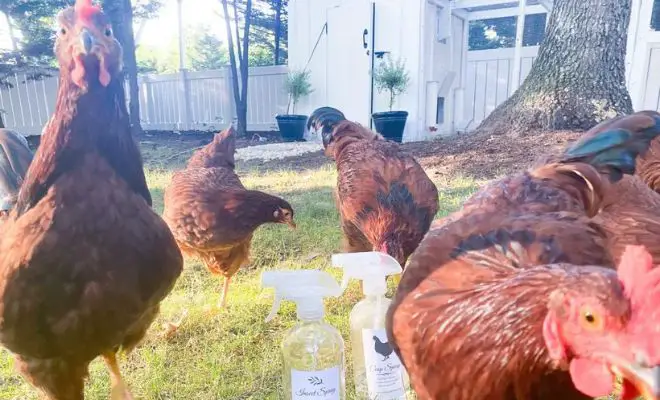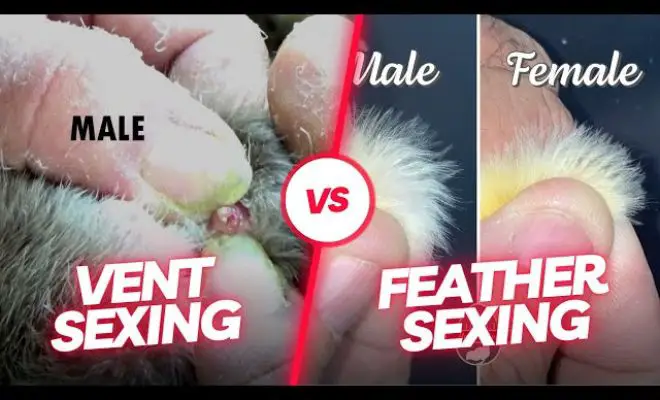Ultimate DIY Poultry Coop Spray that Works!

Poultry keepers want happy, healthy hens, and one way to achieve this is with a special spray. It cleans the coop, making it a safe and comfy place for your feathered friends.
Poultry coop spray can be a game-changer. It comes in various forms, targeting different coop problems. Some sprays disinfect surfaces, eliminating bacteria and viruses. Others focus on battling pesky mites, lice, and other parasites that can stress out your flock. There are even sprays specifically designed to tackle stubborn coop odors.
New to farming? No worries! My guidelines will help you keep everything neat and clean! I’ll also share which one to pick and how it benefits your feathered friends.
Table of Contents
Why Does Your Poultry Coop Need Spray? 5 Reasons!

Poultry coop spray is an essential part of their health and environment. There are 5 main reasons why your poultry coop needs a good spray.
1. Pest and Parasite Management
Those creepy crawlies like duck or chicken mites, lice, and fleas love to set up shop in ducks or coops. They can itch and bother your poultry, and even spread diseases.
Poultry coop spray battles these unwanted visitors and keeps your feathered friends healthy.
2. Ammonia Control
Regular cleaning helps prevent the buildup of ammonia from poultry poop. Ammonia can be harmful to your flock’s respiratory health, so keeping the coop clean is vital. That’s why we use coop spray.
3. Disease Prevention
A clean and sanitized environment reduces the risk of diseases among poultries. It helps prevent conditions like Marek’s disease, mycoplasma infections, respiratory viruses, E. coli, and more.
4. Coop Cleanliness
Chicken or duck coops can get, well, a bit messy. Droppings, leftover food, and dust can build up, creating a breeding ground for bacteria.
Poultry coop spray can disinfect surfaces and help keep your coop clean. It reduces the risk of your chickens or ducks getting sick.
5. Bad Odor
Let’s be honest, poultry coops don’t exactly smell like roses!
Poultry coop spray can help neutralize those stinky coop odors. It makes your coop a more pleasant place for both you and your poultries.
For all of these conditions, there are some basic tips to follow –
Aim to clean out bedding regularly. I recommend deep cleaning the coop at least 2-3 times a year (spring, fall, and winter) and changing the bedding 3-4 times a month.
Use a rake, broom, or dustpan for basic bedding removal. For deep cleaning, a mixture of white vinegar and dawn dish soap works well.
Opt for straw and pine shavings. They’re non-toxic and safe for poultries. Pine shavings are readily available at feed stores.
Related Reads:
- 7 Best Bedding for Duck House
- 5 Lice and Mites on Chicken Coop Treatment
- How to Vacation-proof the Chicken Coop
Poultry Coop Spray: What Are the Types of Spray or Cleaner?
When it comes to poultry coop cleaning, there are two main types of “spray or cleaner” you can consider. Let’s introduce these things!
1. Commercial Sprays
These are the convenient warriors against coop woes. Packed with targeted ingredients, they come in various forms:
- Disinfectants: These sprays fight bacteria and viruses that can make your feathered friends sick. Think of them as tiny germ shields for your coop!
- Pest Control Sprays: These are like bug-zapping superheroes. They target mites, lice, fleas, and other creepy crawlies that can annoy your chickens and ducks and spread disease.
- Deodorizers: Let’s face it, coops can get a bit smelly. Deodorizers neutralize those unwanted odors, leaving your coop smelling fresh and pleasant.
See the video to get more help for using coop spray.
Pros
- Convenient and ready-to-use
- Easy to find at pet stores or farm supply stores
- Effective against specific problems (bacteria, pests, odors)
Cons
- Can be more expensive than DIY options
- May contain harsh chemicals (read labels carefully)
Suggestion: MICROBE-LIFT Chicken Coop Cleaner can be the best. Also, you can go for Eco Strong Chicken Coop Cleaner.
2. DIY Poultry Coop Spray

For the budget-conscious and natural-minded chicken keeper, there’s the DIY route! Here are some common natural ingredients used:
- Vinegar & Water: This classic combo is a disinfectant and mild odor control solution. Vinegar is a natural cleaning powerhouse!
- Essential Oils: Mix water with essential oils such as lavender, peppermint, rosemary, basil, or lemongrass in a spray bottle to repel bugs effectively. Another method is to place herbs like basil and lavender in the nesting boxes. But be careful to use them as they have sensitive respiratory systems.
How to Make a DIY Coop Spray? Here is how you can make the poultry coop spray –
- Gather your supplies: A spray bottle, white vinegar, water, and (optional) essential oils.
- Mix it up: Fill your spray bottle with a 50/50 mix of white vinegar and water. If using essential oils, add only a few drops (like 5-10) per bottle.
- Label and shake: Label your spray clearly (e.g., “DIY Coop Cleaner”) and shake well before each use.
Pros
- More budget-friendly than commercial sprays
- Uses natural ingredients
- Less harsh on poultries
Cons
- May not be as effective as some commercial sprays
- Requires more time and effort to make
3. Natural Poultry Coop Spray
So, what are some natural ways to keep my chicken coop clean?
This term often refers to DIY sprays made with natural ingredients like vinegar and essential oils. They are a natural alternative to commercial sprays that may contain harsher chemicals.
For this –
- Mix about 15ml of vinegar with water in a spray bottle.
- Use it to wipe down surfaces in the coop to keep it smelling fresh.
- Combine 120ml vinegar, 60ml baking soda, and water in a 2-liter spray bottle.
- Spray to freshen up the coop and deter pests.
Look at the following video to get more ideas about coop spray for poultries.
4. Some Other Poultry Coop Cleaner You Can Try
If it’s only about getting rid of mites in the coop, combine –
- 25 cloves of crushed garlic
- 45 drops of eucalyptus essential oil
- 30 drops of lavender essential oil
- 30 drops of peppermint essential oil
- 20 drops of cinnamon bark essential oil
- 2 tablespoons of white vinegar or witch hazel, and
- Water in a container.
It’ll be a perfect homemade poultry coop deodorizer for poultries!
Another alternative idea is making chicken coop cleaner using vinegar and citrus peels. For this, you’ll need –
- Spray bottle
- 1 cup white vinegar
- 4 cups water
- Peels of 1 orange or lemon (dried or fresh)
- Optional: 5-10 drops of lavender or lemongrass essential oil (use sparingly due to chicken sensitivity)
Instructions:
- Fill your clean spray bottle with the white vinegar.
- Drop the orange or lemon peels into the spray bottle.
- Top up the spray bottle with water, leaving some air space at the top.
- If using essential oils, add only a few drops (like 5-10) and swirl gently to mix.
- Allow the mixture to sit for at least 24 hours, allowing the citrus peels to infuse the vinegar with their natural cleaning properties.
- Before each use, shake the spray bottle well.
How to Apply Poultry Coop Disinfectant Spray?

Poultry coop spray is a handy tool for keeping your coop clean and your chickens healthy. But knowing how to apply it safely and effectively is key. Follow the guidelines –
- Grab some safety glasses, gloves, a mask, your coop spray, a broom, and a rag. Then, move your feathered friends to a safe, covered spot outside the coop while you spray.
- Now, take out any feeders, waterers, nesting boxes, or bedding that might get misted. Sweep up any loose debris so the spray can reach all the nooks and crannies. Open all the coop doors and windows to get some fresh air circulating.
- It’s time to shake that spray bottle! Focus on the enemy hideouts: cracks, walls, roosting areas, under nesting boxes, and the coop floor. A light misting is all you need. For pest control sprays, you can also give the outside coop perimeter a quick spritz.
- Safety First! Strong sprays might need some extra protection – safety glasses, gloves, and a mask can help. Never spray your chickens directly, or their food and water sources. Let the coop dry completely before letting your chickens back in (usually takes a few hours).
- Some disinfecting sprays might need a quick rinse on certain surfaces. Check the spray bottle instructions for details. Add fresh, clean bedding when the coop is dry.
- Depending on the spray and your coop situation, you might need to reapply it regularly. Check the label for how often.
- Cease disinfectant spraying three days before and three days after the vaccinations of the chickens.
Related Articles:
FAQs
You can also check the following queries about poultry coop spray.
Q. When should I apply poultry coop spray?
Apply poultry coop spray after cleaning the coop. Or when you notice signs of pests, odors, or needing disinfection.
Q. How often should I use poultry coop spray?
This depends on the spray type and coop situation. Refer to the label for recommended frequency (usually weekly for pest control, less frequent for disinfectants).
Q. What is the best repellent for chickens and ducks?
Most poultry repellents target specific pests. Choose a spray labeled for poultry and the specific pest you’re dealing with (e.g., mites, lice).
Q. Can I spray neem oil in my poultry coop?
Yes, diluted neem oil can be a natural pest-repellent option for poultry coops. Be sure to dilute it properly and avoid contact with chickens and their food/water.
Q. Can I use baking spray for poultry?
No, baking spray is not intended for poultry coops and can be harmful to chickens.
Q. What is the best antiseptic spray for poultry?
Consult your veterinarian for recommendations on antiseptic sprays for poultry wounds. Do not use human antiseptics on chickens.
Final Say
Keeping your poultry coop clean is crucial for your chickens’ health. Whether you use store-bought sprays or make your own, the aim is to create a cozy space for your birds. These sprays fight pests, control smells, and prevent diseases, keeping your coop fresh. Apply them correctly and regularly to maintain a happy flock.
Always prioritize safety, read instructions carefully, and seek vet advice when needed. With care, your coop will be safe and they’ll remain healthy!






